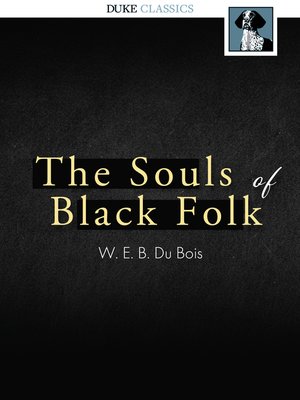


The author applauded the “ planting of the free school among Negroes” (p. Importance of Educationĭu Bois constantly points to education as the principal means of mobility and personality development for Blacks. Isolation in metropolitan cities, economic discrimination, and poverty are evidence of the increasing effects of racism (Wilson 1986 1997). As a result, the inheritance of racism left the complete nation wanting the fundamental human qualities on which it was apparently originated. He in addition educated the reader that discrimination and prejudice not only stymied the Blacks, but had severe consequences for the Whites whose apprehension, suspicion, mistrust, derision, and hatred of Blacks weakened their own humanity. Racism and Race Relationsĭu Bois primarily lay emphasis on the inheritance of racial discrimination and its harmful effects on the lives of Black people. At the heart of the text is the staging of a divergent, dichotomized identity of being Black and American, where the Black identity branded one a “problem” to be overlooked, sympathized, or disgraced and the White personality remained a steady reminder of an inheritance of domination and position to be honored but by no means reached. In some sections of the essay, Du Bois continuously illustrates how their spirit in some way remained intact and all set to battle a new day while the remaining sections consider some ways in which Du Bois’ The Souls of Black Folk updates the discipline of sociology with relation to racism and race relations, monetary discrimination and Black management, edification, and religious conviction and the Black Church. The author’s manner moves from solemn scrutiny to euphoric demonstration as he accounts a history burdened by the irrational, the unreasonable, the pointless, and in some cases, the dreadful. This same theme offers insight into “double consciousness” for Blacks today. The themes of race and religion were woven through each essay to demonstrate life behind “the veil” for the slave, the free person, and the Negro. Popularly known as the Father of social science, Du Bois’ observations and findings are everlasting and several of his worries continue to afflict society even today. government’s labors at Reconstruction to a dialogue of the function of religion in the black community. The work comprises fourteen essays on a variety of topics, ranging from a history of the U.S. The Souls of Black Folk is testimony to Du Bois’ position as one of the leading scholars on race, religion in general, and the Black experience, in particular.


 0 kommentar(er)
0 kommentar(er)
